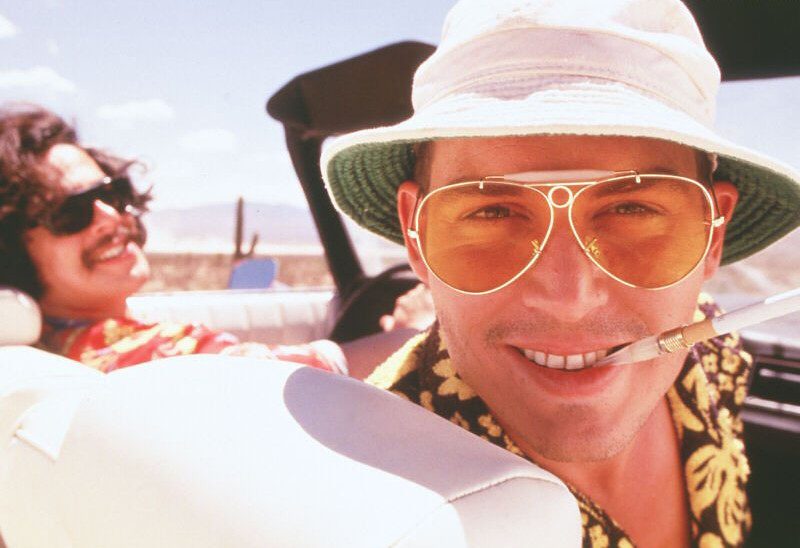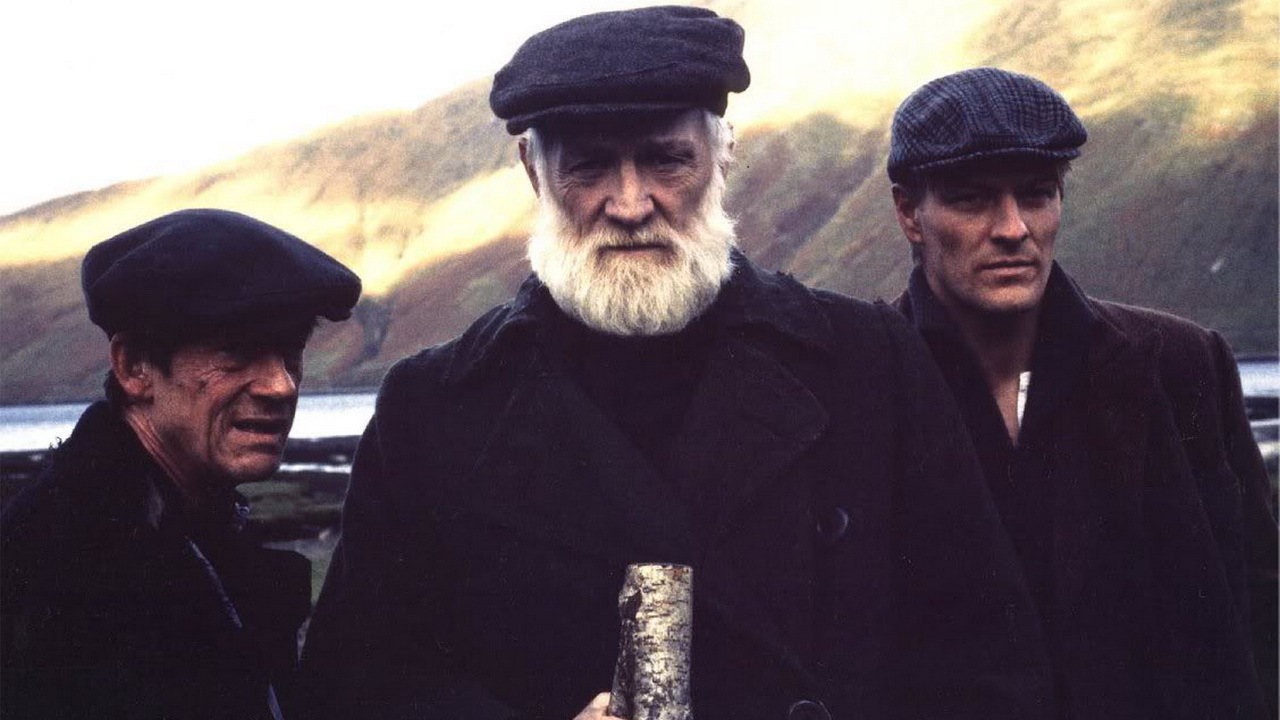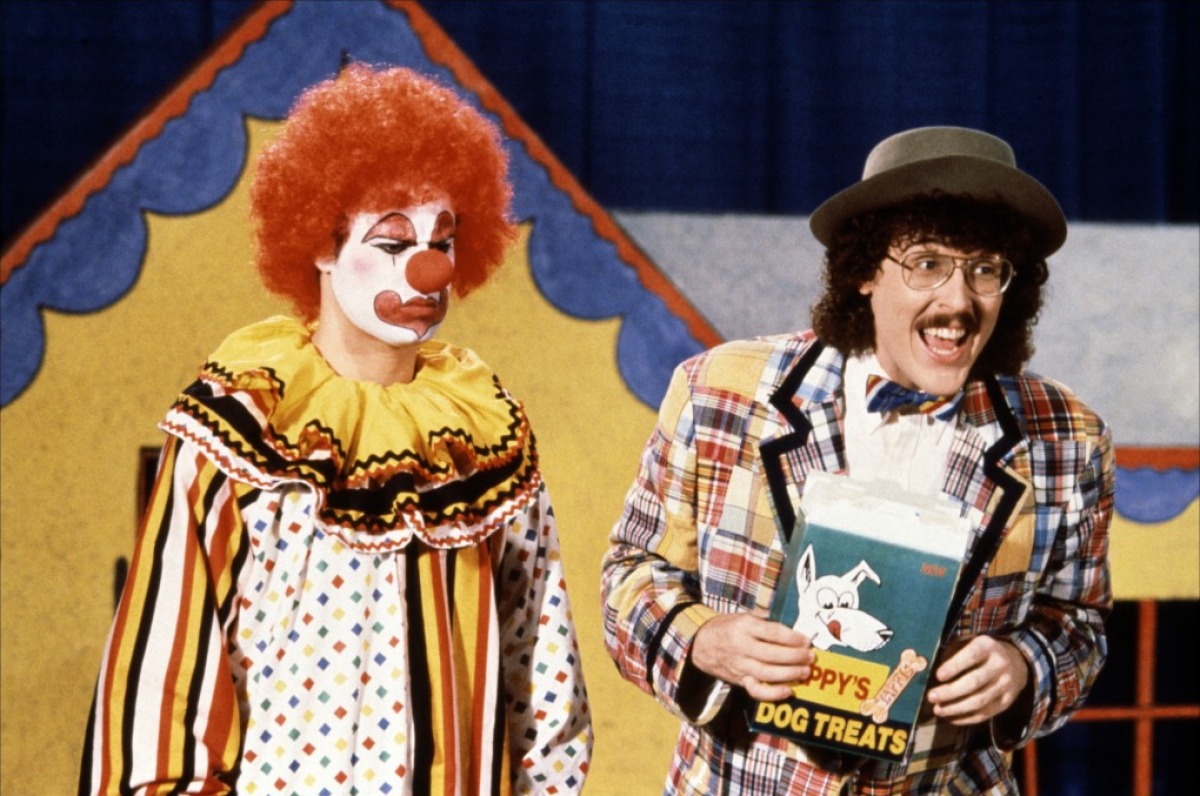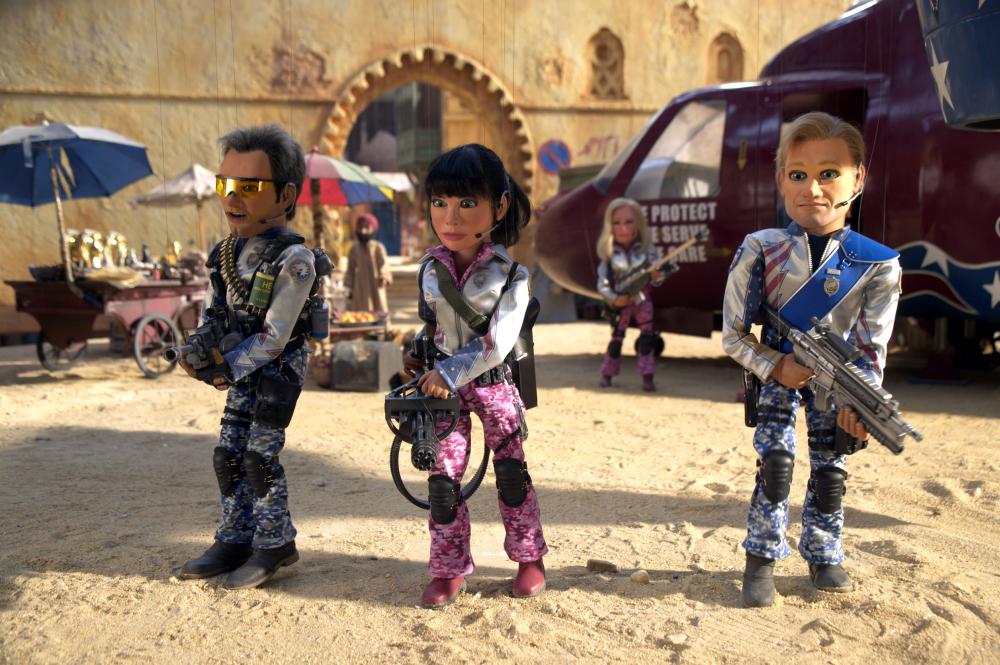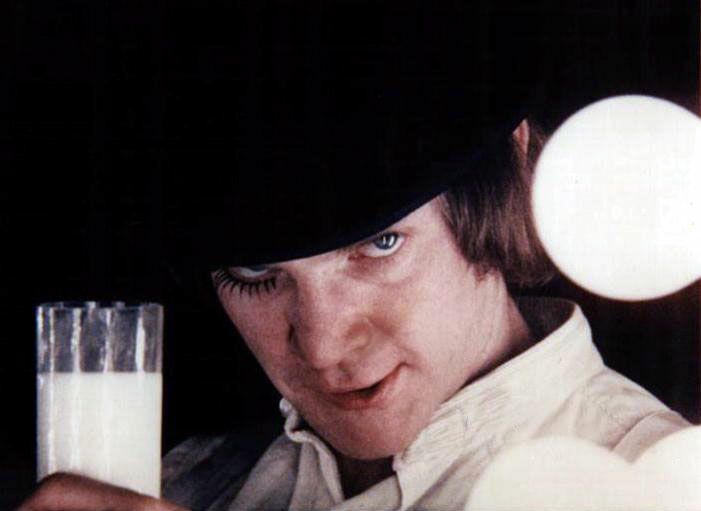6. Fear and Loathing in Las Vegas (1998)
Few film adaptations of great books capture the spirit and energy of their source material as well as director Terry Gilliam’s Fear and Loathing in Las Vegas. Yes, the movie is a bit of a chaotic mess, but then, so is the book.
Dr. Hunter S. Thompson’s masterpiece is a frenzied and brilliant look at the American Dream gone haywire. Johnny Depp and Benicio Del Toro, in their lead performances, get to the sweat-soaked, drugged-out core of their characters, and help create a film unlike any other.
Of course, any film this flat-out bizarre is going to get a wide variety of reactions. For every fan of the film who extols its virtues as a cult classic, there are at least five or six just as fervent viewers that decry it as a steaming pile of garbage. It shouldn’t be that surprising, then, that Roger Ebert hated the film and gave it a paltry one star.
“The result,” he writes, “is a horrible mess of a movie, without shape, trajectory or purpose — a one joke movie, if it had one joke.” Depp’s Raoul Duke (based upon Dr. Hunter S. Thompson) and Del Toro’s demented werewolf-like lawyer, Dr. Gonzo, are using such a wide variety of drugs throughout the movie that it would be inauthentic to the source material to make a more straight-forward, coherent narrative.
This is the kind of movie where one moment Duke is checking into a hotel, and then next he is surrounded by giant, blood-thirsty reptile creatures. Gilliam and company crafted a film that is true to the spirit of both Hunter S. Thompson and his book.
7. The Field (1990)
Writer and director Jim Sheridan’s filmed adaptation of John B. Keane’s stage play, The Field, has always been a polarizing film. Although Richard Harris was deservedly nominated for an Academy Award for Best Actor for his work here, this is still a film that divided audiences. A film that left many moved by its tragic, powerful scope had just as many filmgoers scratching their heads.
The Field remains, all these years later, a haunting and chilling tale of a man too proud to realize the mistakes he’s made until it’s too late. It is provocative in the way few films are. Surely, this is a story that deserved to be made into a movie, as cinematographer Jack Conroy captures the breathless beauty and mystery of Ireland in his compositions. In his one star review of the film, Roger Ebert writes: “this was not a work that called out to be filmed. Once filmed, it calls out to be forgotten.”
One of Ebert’s main criticisms is the field itself. He writes that since the film shows us the field, we can easily see that Bull and his ancestors have been “wasting their efforts dragging that wet seaweed up the cliff to fertilize the field, because the village is surrounded by thousands of acres of prime pasturage.”
Of course, a point of the film seems to be that Bull and his family are barely making due, and the laborious chore of hauling that seaweed up those haggard cliffs on the seaside is a good metaphor for that. Ebert seems to have missed what Sheridan and Keane were saying in this tragic and astonishing work.
8. UHF (1989)
Like Shawshank Redemption or the original Terminator, UHF was a movie that didn’t do well in the theaters but found a second life on video. Directed by Jay Levey, UHF is a goofy, silly satire with some of the biggest laughs of any film of the 1980s. Starring Weird Al Yankovic (in his only leading film role) and a pre-Kramer Michael Richards, UHF remains one of the key cult comedies of the last thirty years.
It’s understandable that many critics wouldn’t get humor this absurd (although UHF has a sixty-six percent rating on Rotten Tomatoes, which is pretty high for this kind of movie). Most mainstream critics at the time dismissed UHF as an unfunny film at best, and as a travesty to cinema at worst. In his one star review, Ebert refers to it as “the dreariest comedy in many a month, a depressing slog through recycled comic formulas.”
Ebert was not amused at the film’s multiple movie and television parodies, which include a terrific opening that spoofs Raiders of the Lost Ark, a game show called Wheel of Fish, Conan the Librarian and, of course, Raul’s Wild Kingdom.
In a comedy, “when anything goes, nothing is funny,” Ebert says. Of course, by saying this he disregards films such as The Kentucky Fried Movie, Airplane!, National Lampoon’s Animal House, Caddyshack and the original Naked Gun, which are all comedies where absolutely anything goes.
9. Team America: World Police (2004)
It took Trey Parker and Matt Stone, the comic anarchists behind South Park, to make a post-9/11 comedy that dared to be provocative and offensive. The genius behind the film is that, for all of its political elements, the film is really just a 98 minute parody of Michael Bay-type cinema, with puppets. Imagine that old television show The Thunderbirds, only with lots of tasteless jokes and much more singing.
Roger Ebert writes, in his one star review of the film, that “Team America: World Police is an equal opportunity offender, and waves of unease will flow over first one segment of their audience, and then another.” Ebert, who was a fan of Mel Brooks’ also controversial comedies back when many critics dismissed them, seems to have forgotten the Mel Brooks quote he used in many of his reviews: “my movies rise below vulgarity!”
Much like Blazing Saddles or There’s Something about Mary, Team America: World Police dared to be shocking at a time when comedies were no longer allowed to be daring.
Ebert seemed to be disappointed that the film, politically, didn’t take a side. As Ebert says, “it is neither for nor against the war on terrorism, just dedicated to ridiculing those who wage it and those who oppose it.” Ebert, who championed many challenging comedies that most serious critics ignored, missed the boat on this one.
10. A Clockwork Orange (1971)
The last film on this list is Stanley Kubrick’s chilling and terrifying masterpiece, A Clockwork Orange. Now Ebert gave the film two stars in his review, but if you read the review, he is describing a one-star movie.
Over the years, Ebert changed his mind on several films that originally left him cold (like Blade Runner and The Godfather, Part II), but he never changed his mind on A Clockwork Orange (which, interestingly enough, is one of Chaz Ebert’s, Roger’s widow, favorite films).
Even when the reader disagrees with Ebert’s take on a film, one still appreciates the wit, nerve and pure joy with which Ebert writes. From the opening of his two star review: “Stanley Kubrick’s A Clockwork Orange is an ideological mess, a paranoid right-wing fantasy masquerading as an Orwellian warning.” Ebert’s biggest complaint with the film is that our protagonist is a nasty, young criminal named Alex (played in one of the great performances of cinema by Malcolm McDowell).
As Ebert says, “it pretends to oppose the police state and forced mind control, but all it really does is celebrate the nastiness of its hero, Alex.” A Clockwork Orange, which remains one of Kubrick’s most challenging works, stars a terrible and violent man. Like Taxi Driver or Henry: Portrait of a Serial Killer, it follows a person who does and says things very different than what most of us might do or say.
Ebert felt that Kubrick glamorized the violence, and also accused Kubrick of hero-worshipping a character that, in many other films, would be the villain. In his original review, Ebert seemed to predict that argument over the virtues of A Clockwork Orange isn’t going away anytime soon: “We’ll probably be debating A Clockwork Orange for a long time– a long, weary and pointless time.”
Author Bio: Adam Gray is a teacher, film critic and writer. He writes about film at his blog: https://topshelfmovies.wordpress.com/.
